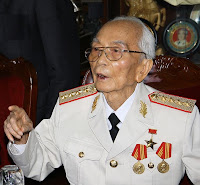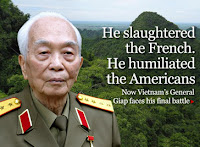 Il Vietnam celebra i 100 anni del generale Giap.
Il Vietnam celebra i 100 anni del generale Giap.
(per la traduzione in italiano cliccare qui)
The famous independence hero was born August 25, 1911 in a central-north province. His name is linked to the wars against the French, Japanese and U.S.. He is still remembered for the battle of Dien Bien Phu in the plain, in 1954, which ended the war in Indochina. He is also a vocal critic of the government and the Party.
After defeating the French, Japanese and Americans one after the other, he also seems to have defeated time itself: General Vo Nguyen
 Giap, hero of the Vietnamese, today celebrates his 100th birthday. He was born August 25, 1911 in central-north Quang Binh province to a poor family, composed of seven siblings, some of whom died young. Politically active since his school years, he was expelled from a school in Hue for organizing student protests. But his name is tied hand in glove with the wars in Indochina in the second half of the 1900’s, so much so that the Vietnamese people consider him the second most important national personality, only after "Uncle" Ho Chi Minh.
Giap, hero of the Vietnamese, today celebrates his 100th birthday. He was born August 25, 1911 in central-north Quang Binh province to a poor family, composed of seven siblings, some of whom died young. Politically active since his school years, he was expelled from a school in Hue for organizing student protests. But his name is tied hand in glove with the wars in Indochina in the second half of the 1900’s, so much so that the Vietnamese people consider him the second most important national personality, only after "Uncle" Ho Chi Minh.
Do Quy Doan, Vice Minister of Culture, recalled that "some of the country's most glorious and most important events are associated with his name and his cause." Yesterday, the four-star general received a delegation of Communist Party politicians and leaders, to celebrate the centenary. He still has a colonial-style villa in Hanoi, not far the mausoleum of Ho Chi Minh, in the city center, where until three years ago he would still receive foreign he
 ads of state and leaders. The official Viet Nam News Agency reports the elderly leader’s "thanks" and "renewed commitment" to the conquest of new objectives
ads of state and leaders. The official Viet Nam News Agency reports the elderly leader’s "thanks" and "renewed commitment" to the conquest of new objectives
His most famous military conquest dates back to May 1954, with the historical humiliation of the French army in the Dien Bien Phu plain. General Giap, thanks to a clever counter-offensive, cut the trans-Alpine lines, causing them to collapse and ending the war in Indochina. The Hanoi government this week dedicated a photo exhibition to his enterprise with decades-old pictures in black and white.
However, in recent years he has repeatedly clashed with the Vietnamese government, accusing them of promoting policies all too "pro-Chinese" to the detriment of the c
 ountry's territorial and economic independence. Among others, the battle against the bauxite mining program in the Central Highlands, the exploitation of which (for the benefit of Beijing) has provoked criticism from scientists and environmentalists.
ountry's territorial and economic independence. Among others, the battle against the bauxite mining program in the Central Highlands, the exploitation of which (for the benefit of Beijing) has provoked criticism from scientists and environmentalists.
Finally, his accusations of corruption against political leaders and his criticism of the bureaucracy and the party led to his marginalization from the political scene for the past 25 years. In a speech to Congress in 2006 he repeatedly insisted on the need for transparency and democracy and decisive action against corruption. "A party that conceals its defects is in ruins - Giap wrote in a state newspaper - a party that admits its mistakes and is transparent is courageous, strong and honest."


























